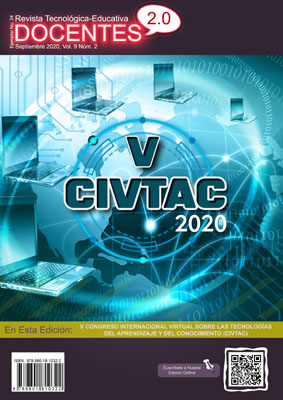Technoemotional Teaching in the Education of the XXI Century
 DOI:
https://doi.org/10.37843/rted.v9i2.147
DOI:
https://doi.org/10.37843/rted.v9i2.147
Main Article Content
Abstract
Today, society demands that teachers have skills and be digitally literate to exercise a pedagogical practice that supports meaningful learning for 21st century students. Today's society has had a strong integration of technology in all areas of life, which has allowed man to have access to an extensive amount of information from anywhere in the world. The generations of the 21st century is under the influence of technology, which implies that the training teachers of the 20th century have had to unlearn to enrich their pedagogical practice supported by technology. The present study arose from the need to create classrooms that support the needs of the students, among them, the motivation to learn to learn, such as the effects that technology has on them. It was a quantitative methodological research, the purpose of this was to explain social reality from an objective perspective to create pedagogical plans to improve Technological-Educational instruction. The research was completed on the Technological-Educational Docentes 2.0 platform, with a population of 369 student-teachers. Surveys were carried out to evaluate the knowledge and motivation of the population under study, as well as the revision of classroom planning. Therefore, the results revealed that student-teachers were motivated using technology in the classroom, which drives the strengthening of teachers worldwide supported by Learning and Knowledge Technologies (TAC).
Downloads
Metrics
Article Details

This work is licensed under a Creative Commons Attribution-NonCommercial-NoDerivatives 4.0 International License.
Those authors who have publications in our journal accept the following terms:
- When a work is accepted for publication, the author retains rights of reproduction, distribution of his/her article for exploitation in all countries of the world in the format provided by our magazine and any other magnetic medium, optical, and digital.
- Authors will retain their copyright and guarantee the journal the right first to publish their work, which will be simultaneously subject to the Creative Commons Acknowledgment License (Attribution-NonCommercial-NoDerivatives 4.0 International (CC BY-NC-ND 4.0)). That allows third parties to copy and redistribute the material in any medium or format, under the following conditions: Acknowledgment - You must properly acknowledge authorship, provide a link to the license, and indicate if any changes have been made. You may do so in any reasonable way, but not in a way that suggests you have the licensor's endorsement or receive it for your use. NonCommercial - You may not use the material for a commercial purpose. NoDerivatives - If you remix, transform, or build from the material, you cannot broadcast the modified material. There are no additional restrictions - You cannot apply legal terms or technological measures that legally restrict you from doing what the license allows.
- Authors may adopt other non-exclusive license agreements to distribute the published version of the work (e.g., deposit it in an institutional archive or publish it in a monographic volume) provided that the initial publication in this journal is indicated.
- Authors are allowed and recommended to disseminate their work through the Internet (e.g., in institutional telematic archives, repositories, libraries, or their website), producing exciting exchanges and increasing the published work's citations.
- Request of withdrawal an article has to be done in writing by the author to the Editor, becoming effective after a written response from the Editor. For this purpose, the author or authors will send correspondence via e-mail: [email protected].
- The author will not receive financial compensation for the publication of his work.
- All Docentes 2.0 Journal publications are under the Open Journal System (OJS) platform at: https://ojs.docentes20.com/.
References
Barráez, D. (2020). La educación a distancia en los procesos educativos: Contribuye significativamente al aprendizaje. Revista Tecnológica-Educativa Docentes 2.0, 8(1), 41-49, https://ojs.docentes20.com/index.php/revista-docentes20/article/view/91
Brod, C. (1984). Technostress. Reading, Mass: Addison-Wesley.
De la Gándara-Martín, J.J., Álvarez Álvarez-Monteserin, M.T. (2010). Adicciones emergentes. En: Vallejo Ruiloba J, Leal Cercós C, Tratado de Psiquiatría Volumen I. 2º edición (pp. 913-924). Barcelona: Ars Medica.
Denzin, NK. (2009). On Understanding Emotion. New Brunswick, NJ: Transaction Publishers.
Hudiburg, RA. (1995). Psychology of computer use: XXXIV. The Computer Hassles Scale: subscales, norms, and reliability. DOI: 10.2466/pr0.1995.77.3.779
Instituto Nacional de Seguridad y Salud en el Trabajo (INSST) (2019). Tipo de tecnoestrés. Recuperado de https://www.insst.es/-/-que-es-el-tecnoestres-
Makrakis (2005). Training teachers for new roles in the new era: Experiences from the United Arab Emirates ICT program, en Actas de la
Tercera Conferencia Panhelénica sobre Didáctica de la Informática, Corinto (Grecia).
Mann, C. L. (2004). This is Bangaore calling: hang up. What technology. enable international trade in services U.S. Economy and
Workforces. Federal Reserve Bank of Cleveland. Research Department. P.O. Ebsco- Academia- Search Premie
Martinez, M. (2018). ¿Te da miedo la tecnología? En su día, la electricidad dio miedo. Recuperado de https://www.nobbot.com/futuro/te-da-miedo-la-tecnologia/
Mujica-Sequera, R. (2018). Alfabetismo Digital. Recuperado de https://blog.docentes20.com/2018/12/alfabetizacion-digital-docentes-2-0/
Mujica-Sequera, R. (2020). ¿Qué es Tecnoestrés? Recuperado de: https://blog.docentes20.com/2020/01/que-es-el-tecnoestres-docentes-2-0/
Prensky, M. (2001). Digital natives, digital immigrants’ part 1. On the Horizon-The Strategic Planning Resource for Education
Professionals n. 1 Vol. 6. Recuperado de http://www.ingentaconnect.com/content/mcb/274/2001/00000009/00000005/art00001
Real Academia Española. (2014). Diccionario de la lengua española (23.a ed.). Consultado en https://dle.rae.es/tecnolog%C3%ADa?m=form
Salas, R. (2003). ¿La educación necesita realmente de la neurociencia? Estudios Pedagógicos, n. 29, 2003, pp. 155-171. http://dx.doi.org/10.4067/S0718-07052003000100011
UNESCO (1998). La educación superior en el siglo XXI. Visión y acción. Documento de trabajo de la conferencia Mundial sobre la Educación Superior. Recuperado de: https://unesdoc.unesco.org/ark:/48223/pf0000116345_spa
Vygotski, L. S. (1995). Obras Escogidas. Visor. Madrid.
Zeballos, M. (2020). La evaluación de los aprendizajes mediadas por las TAC. Revista Tecnológica- Educativa Docentes 2.0, 9(1), 83-95. https://doi.org/10.37843/rted.v9i1.98






